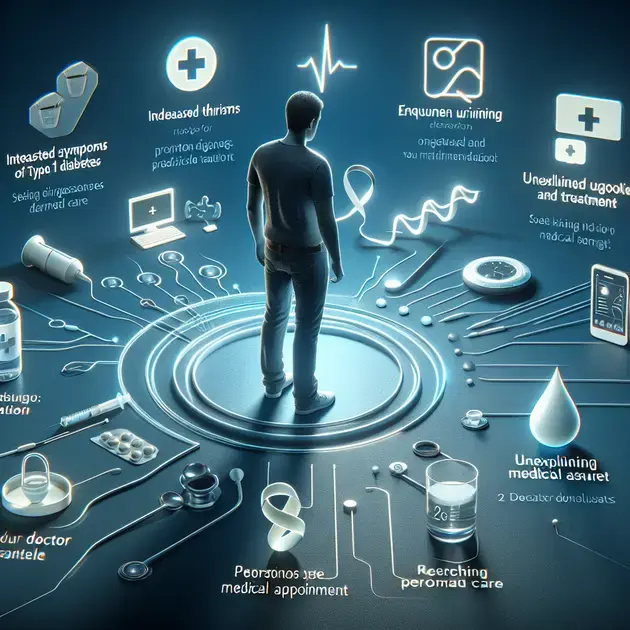Understanding the differences between type 1 diabetes and type 2 diabetes is crucial for effectively managing these conditions. With type 1 diabetes, the body’s immune system attacks the insulin-producing beta cells in the pancreas, leading to little to no insulin production. On the other hand, type 2 diabetes is characterized by insulin resistance, where the body’s cells do not respond effectively to insulin.
Recent research has shown that individuals with type 1 diabetes are more likely to develop other autoimmune conditions, such as celiac disease and thyroid disorders, compared to those with type 2 diabetes. This highlights the importance of understanding the specific challenges and risks associated with each type of diabetes to provide tailored care and support for individuals living with these conditions.
Key Differences Between Type 1 and Type 2 Diabetes
When it comes to diabetes, understanding the key differences between Type 1 and Type 2 is crucial for effective management. Type 1 diabetes is an autoimmune condition where the body attacks its pancreas cells, leading to little to no insulin production. On the other hand, Type 2 diabetes is characterized by insulin resistance, where the body doesn’t effectively use insulin.
1. Symptoms: Type 1 diabetes often presents with sudden symptoms such as extreme thirst, weight loss, and fatigue, while Type 2 symptoms may develop gradually and include frequent urination, blurred vision, and slow wound healing.
2. Treatment: Type 1 diabetes requires daily insulin injections to manage blood sugar levels, while Type 2 diabetes may be managed through oral medications, lifestyle changes, and in some cases, insulin therapy.
3. Risk Factors: Type 1 diabetes is primarily genetic and not linked to lifestyle choices, whereas Type 2 diabetes is closely associated with obesity, poor diet, and sedentary lifestyle.
4. Age of Onset: Type 1 diabetes is often diagnosed in children and young adults, while Type 2 diabetes is more common in adults over the age of 45, though the age ranges are becoming more blurred.
5. Prevention: While Type 1 diabetes cannot be prevented, Type 2 diabetes may be delayed or prevented through maintaining a healthy weight, balanced diet, and regular physical activity.
Unique Risks Associated with Type 1 Diabetes
Type 1 diabetes poses unique risks and challenges compared to Type 2 diabetes, requiring specialized care and attention. Individuals with Type 1 diabetes have a higher risk of developing diabetic ketoacidosis (DKA), a serious condition characterized by high blood sugar levels and ketone buildup. It is crucial for individuals with Type 1 diabetes to regularly monitor their blood sugar levels and ketones to prevent DKA.
1. Hypoglycemia: People with Type 1 diabetes are more prone to hypoglycemia or low blood sugar episodes, which can lead to dizziness, confusion, and even loss of consciousness. It’s important for individuals with Type 1 diabetes to always carry fast-acting glucose sources to treat hypoglycemia promptly.
2. Long-Term Complications: Type 1 diabetes can increase the risk of long-term complications such as nerve damage, kidney disease, and cardiovascular issues if blood sugar levels are not well managed over time. Regular check-ups and monitoring are essential to prevent these complications.
3. Dietary Restrictions: Individuals with Type 1 diabetes need to carefully monitor their carbohydrate intake and meal timing to maintain stable blood sugar levels. Apps like MyFitnessPal and MySugr can help track food intake and blood sugar readings to aid in meal planning.
4. Continuous Glucose Monitoring: Utilizing continuous glucose monitoring systems like Dexcom or Freestyle Libre can provide real-time insights into blood sugar trends, helping individuals with Type 1 diabetes make informed decisions about their insulin dosages and lifestyle choices.
5. Mental Health Support: Managing a chronic condition like Type 1 diabetes can take a toll on mental health. Seeking support from therapists, diabetes educators, or online communities like Beyond Type 1 can provide emotional support and coping strategies.
Tailored Care for Type 1 and Type 2 Diabetes
Care for Type 1 and Type 2 diabetes should be personalized to address the specific needs and challenges of each condition. Tailored care involves considering individual lifestyle factors, preferences, and medical history to create a comprehensive treatment plan.
1. Healthcare Team: Building a multidisciplinary healthcare team that includes endocrinologists, dietitians, diabetes educators, and mental health professionals can ensure holistic care for individuals with diabetes.
2. Self-Management Education: Both Type 1 and Type 2 diabetes require ongoing education on monitoring blood sugar levels, administering insulin, managing medications, and making healthy lifestyle choices. Apps like Glucose Buddy and One Drop provide educational resources and tracking tools.
3. Regular Monitoring: Routine monitoring of blood sugar levels, blood pressure, cholesterol levels, and kidney function is essential for early detection of any complications and adjusting treatment plans accordingly. Devices like Accu-Chek and Omron can assist in monitoring these parameters.
4. Physical Activity: Encouraging regular physical activity tailored to individual preferences and capabilities can help improve insulin sensitivity, blood sugar control, and overall well-being. Fitness apps like Fitbit and Nike Training Club offer workout plans for all fitness levels.
5. Emotional Support: Living with diabetes can be challenging emotionally, and having access to support groups, counseling services, and mindfulness apps like Headspace or Calm can help individuals cope with the psychological impact of diabetes.
**Recognizing the Early Symptoms of Type 1 Diabetes**
Understanding the early signs
Recognizing the early symptoms of Type 1 Diabetes is crucial in ensuring timely diagnosis and treatment. Some common signs to watch out for include frequent urination, excessive thirst, unexplained weight loss, fatigue, and blurred vision. If you or someone you know experiences these symptoms, it is important to seek medical attention promptly.
Furthermore, individuals with Type 1 Diabetes may also experience increased hunger, irritability, and mood changes. These signs often develop rapidly and can be severe, requiring immediate intervention. Being aware of these early symptoms can help in managing the condition effectively.
To confirm a diagnosis of Type 1 Diabetes, healthcare professionals may conduct blood tests to measure glucose levels and assess the functioning of the pancreas. Early detection is key in preventing complications and maintaining overall health.
Education and awareness play a significant role in recognizing the early symptoms of Type 1 Diabetes. By staying informed and attentive to changes in the body, individuals can take proactive steps towards managing their health and well-being.
Remember, early detection and timely intervention can make a significant difference in the management of Type 1 Diabetes and improve the quality of life for those affected by the condition.
Seeking medical advice
If you suspect you or a loved one may be experiencing the early symptoms of Type 1 Diabetes, it is essential to consult a healthcare professional promptly. Medical experts can provide an accurate diagnosis, create a personalized treatment plan, and offer guidance on lifestyle adjustments to manage the condition effectively.
During the consultation, be prepared to discuss your symptoms, medical history, and any concerns you may have. Healthcare providers may recommend additional tests or screenings to confirm the diagnosis and tailor the treatment approach to your individual needs.
Remember that early intervention can help prevent complications and improve long-term outcomes for individuals with Type 1 Diabetes. By seeking medical advice promptly, you can take control of your health and well-being.
Regular check-ups and follow-up appointments are essential in monitoring the progression of Type 1 Diabetes and adjusting the treatment plan as needed. Collaborating with healthcare professionals can empower you to effectively manage the condition and lead a fulfilling life.
Don’t hesitate to reach out to your healthcare provider if you have any concerns about Type 1 Diabetes or require additional support. Your well-being is paramount, and professional guidance can make a significant difference in your journey towards health and wellness.
**Conclusion**
Recognizing the early symptoms of Type 1 Diabetes is crucial for timely diagnosis and treatment. Common signs such as frequent urination, excessive thirst, unexplained weight loss, fatigue, and blurred vision serve as red flags that should prompt immediate medical attention. Additionally, heightened hunger, irritability, and mood fluctuations may manifest rapidly, requiring swift intervention for effective management of the condition.
Healthcare professionals play a pivotal role in confirming a Type 1 Diabetes diagnosis through blood tests to evaluate glucose levels and pancreatic function. Early detection not only aids in preventing complications but also contributes to overall health maintenance. Education and awareness are key in empowering individuals to proactively manage their well-being by staying informed and attentive to bodily changes.
Seeking prompt medical advice is paramount if you suspect early symptoms of Type 1 Diabetes in yourself or a loved one. Consulting with healthcare experts enables accurate diagnosis, personalized treatment planning, and lifestyle adjustments tailored to individual needs. Early intervention significantly enhances long-term outcomes, emphasizing the importance of taking control of one’s health early on.
Regular check-ups and follow-ups are essential for monitoring the progression of Type 1 Diabetes and adapting treatment strategies accordingly. Collaborating with healthcare professionals not only facilitates effective condition management but also empowers individuals to lead fulfilling lives. Do not hesitate to communicate any concerns or seek additional support from your healthcare provider, as professional guidance is instrumental in navigating the journey toward health and wellness.
Remember, by recognizing early symptoms, seeking timely medical advice, and staying proactive in managing Type 1 Diabetes, individuals can substantially enhance their quality of life and mitigate potential health risks in the long run.

